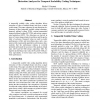Free Online Productivity Tools
i2Speak
i2Symbol
i2OCR
iTex2Img
iWeb2Print
iWeb2Shot
i2Type
iPdf2Split
iPdf2Merge
i2Bopomofo
i2Arabic
i2Style
i2Image
i2PDF
iLatex2Rtf
Sci2ools
113
click to vote
ICIP
1999
IEEE
1999
IEEE
Distortion Analyses for Temporal Scalability Coding Techniques
A temporally scalable video coding algorithm allows extraction of video of multiple frame rates from a single coded stream. This paper compares the rate-distortion performance of three temporally scalable coding techniques: temporal subband coding (TSB), motion-compensated temporal subband coding (MC-TSB), and motion compensated prediction (MCP). The distortions are derived in terms of various temporal pixel correlations and the probability of occlusion. Measured values are used to predict performances at full- and lower-frame-rates, and a comparison with experimental quantitative performances demonstrates that the performance ranking is correctly predicted and bounds the accuracy of the analyses at high rates. MCP and MC-TSB always outperform TSB. For high bit rate full-frame-rate video, MCP and MC-TSB perform equivalently. At lower frame rates, MCP provides better performance.
ICIP 1999 | Image Processing | Scalable Coding Techniques | Temporal Pixel Correlations | Video Coding Algorithm |
Related Content
| Added | 25 Oct 2009 |
| Updated | 25 Oct 2009 |
| Type | Conference |
| Year | 1999 |
| Where | ICIP |
| Authors | Sheila S. Hemami |
Comments (0)

